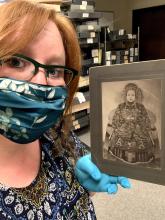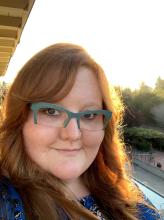Amanda Robb, UW History alumna (MA ’18), recently landed a full-time job as a Chinese Language Materials Archivist at the Hoover Institution Library & Archives, Stanford University. She started the position in September 2020, after obtaining an MLIS (Master of Library and Information Science) degree at the UW.
As an archivist at HILA , Amanda’s work primarily involves processing untapped documents and making them digitally accessible to academic users. She is currently working on the digitalization of the papers of H. H. Kung, a treasure trove of primary sources for understanding Republican-era Chinese history (1912-1949). “This is the first big project of the Digital First Initiative here at Hoover,” Amanda explained.
Key aspects of her profession as an archivist include facilitating historical research and preserving the historical record. “As an archivist, my priority is to create better ‘access points’ for users,” however, the way in which “archivists arrange a collection will influence how future researchers interact with this source material.”
To this end, Amanda further explained, “What I am doing every day is assessing each object, looking for conservation issues, rehousing where necessary, considering best arrangement practices, and then assigning keywords, a brief description, and inputting that information in the digital database ArchivesSpace to update our finding aids.”
Amanda also emphasized that her training in Chinese history gave her critical skills to enable her to evaluate the content of each document and process it in a way that would best assist researchers. Not only does her subject specialization allow her to identify potentially useful subjects or themes for description, she is also able to put herself in the researcher’s shoes. “When I am processing an object, I always ask myself: If I were a researcher, what might I want to discover here? How can I reflect this in the finding aid descriptions?”
The two-year MLIS program, which Amanda completed in Spring 2020, focuses on training the innovators and the leaders of the library and information world. “One of the most important skills I learned from the MLIS is how to make information more accessible to those who need it,” she added.
Amanda began her job hunt around February 2020, shortly before the Covid-19 pandemic shut down the world. “I was searching for ‘Chinese librarian’ on different job websites to get a sense of what was out there, and the Stanford position just popped up.”
“Within only a couple days of applying I got into the first-round interview with HR. Then I had a really positive second one with Chinese studies specialists.” Amanda eventually went through all four rounds of intensive job interviews. After acing the final round, she received a hard-earned yet well-deserved offer in August 2020.
What made Amanda stand out among all the candidates was her dual training in Chinese history and Chinese language. With two master’s degrees in history and another one in library and information science, she demonstrated a superb combination of the essentials skills the hiring committee was looking for—expertise in modern Chinese history, knowledge of traditional and simplified Chinese, and professional training in library sciences.
“I think they chose me because I was a great fit for the position,” said Amanda. “My history background was the key—they were not just looking for an archivist or someone with an MLIS who knows Chinese, but someone who also has solid training in modern Chinese history, especially the history of the Nationalist era.”
Speaking of her transition to the librarian/archivist career track, Amanda recalls a pivotal moment when taking HSTRY 571 History as a Profession, the Department of History’s inaugural graduate course for exploring history careers. She was sitting in the first iteration taught by Prof. Purnima Dhavan in Winter 2016. A core assignment of the class is to conduct informational interviews with individuals from three different history career tracks.
“This assignment created an opportunity for me to think seriously about career diversity,” said Amanda. After interviewing a Chinese language librarian at the Library of Congress, she began to consider the librarian/archivist career track as a potential option.
In 2018, the Department of History’s advising team and a large UW network helped Amanda successfully transition to the MLIS program.
At the UW, Amanda also had opportunities to work with libraries on campus. For instance, in collaboration with Dr. Zhijia Shen, director of Takeuchi East Asia Library (TEAL), she created a Chinese special collection exhibit for the TEAL. “My experience with the exhibition helped in my job interview, because Hoover hopes to create an online exhibition for the Kung papers.” Moreover, working with Government Publications, Maps, Microforms, and Newspapers (GMM) in the Suzzallo Library gave her invaluable experience with a wide range of materials she now processes at HILA.
For history majors and graduate students interested in pursuing a librarian/archivist career, Amanda emphasizes that the Department of History offers rich resources, such as HSTRY 571, for exploring career diversity. “Take a step back and look around at what career options are available. Do informational interviews—the more information, the better.”

